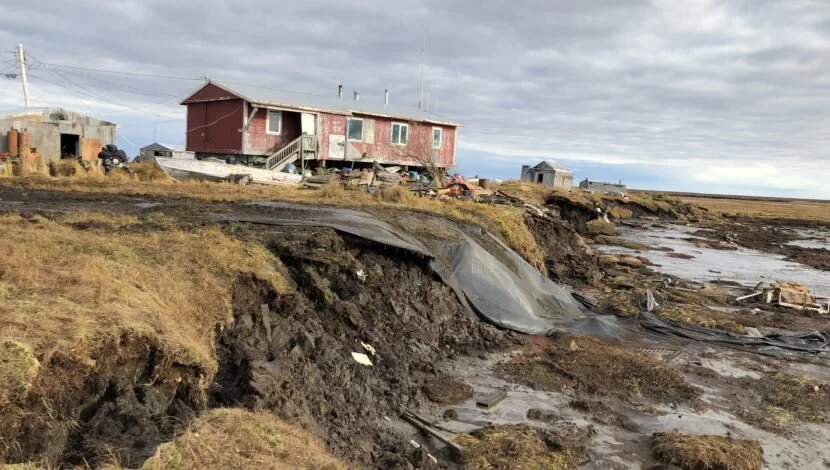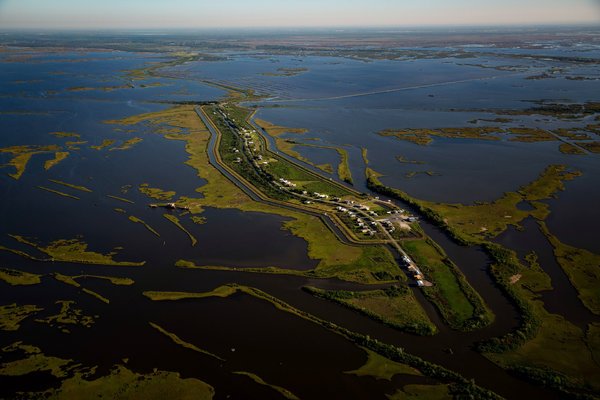““We must be more than resilient; we must be relentless. Relentless in our pursuit of justice.””
Restoring Louisiana Marshes: Protecting Land, Increasing Resilience, and Reducing Flood Risk
This project involves filling in the canals dredged in Louisiana’s wetlands in order to restore marsh ecosystems, reduce land loss and flood risk, and protect land. The Grand Bayou, Grand Caillou/Dulac, and Pointe-au-Chien tribes initiated this project which integrates coastal resilience activities and cultural heritage. Learn more by clicking any of the links below:
“The Lowlander Center and First People’s Conservation Council of Louisiana are restoring wetlands damaged from dredging more than 10 thousand miles of canals for oil and gas exploration in coastal Louisiana. Wetland losses have a disproportionate impact on the First Peoples of Louisiana because their disappearance threatens the social, agricultural, and cultural, community dynamics including sacred burial grounds. Shellfish and finfish harvested by the community are directly dependent on these wetlands and wetland loss means communities lose protection from storms and flooding. The restoration methods used are successful within 2 years, inexpensive, and prevent further wetland losses.”
Lowlander Center and Harvard University Solar Micro-Grid Project
This research project is a summer program where students, scholars, practitioners, and activists work together on some of the most pressing issues of our time. Five Research Assistants, all undergraduate students at Harvard University, work with Prof. Jason Beckfield on a faculty-led research project, along with Research Coordinator D.A. Evrard, and collaborators at the Lowlander Center. The approach we take is that of Participatory Action Research, as practiced by the Lowlander Center. The Lowlander Center works for and supports communities living close to the Gulf Coast in Louisiana and Texas, and as part of that work, are engaged in research on how enabling low-lying communities can maintain energy independence and renewable energy entrepreneurial opportunities.
This summer, we focused on local solar-powered microgrids in the Gulf Coast region of the United States. Fellows’ responsibilities include writing brief reports on research on the social processes of community engagement, writing brief reports on the history of Indigenous communities’ relationships to energy producers in the region, interviewing people currently living on the US Gulf Coast about how they relate to traditional energy and renewable energy, learning about the regulatory environment for “on-grid” and “off-grid” energy transition, gathering demographic data on the region’s communities, and synthesizing information in support of the Lowlander Center’s work to support resilient recovery for low-lying communities. The goals of the research project are set collaboratively and include the development of information necessary to apply to US federal agencies for financial support of micro-grid development.
The Roosevelt Project: Moving Towards Decarbonization
Transitioning the United States economy toward deep decarbonization will have unequally distributed effects, positive and negative, across socio-economic groups, geographies and economic sectors. The concerns of workers and communities adversely affected by the transition must inform the discussion around decarbonization, associated policy changes and institutional development. The goal of the Roosevelt Project is to provide an analytical basis for charting a path to a low carbon economy in a way that promotes high quality job growth, minimizes worker and community dislocation, and harnesses the benefits of energy technologies for regional economic development. Lowlander was a contributor for this project which resulted in helping to access the needs of solar and providing for solar in under resourced communities across the Louisiana coastal region.













